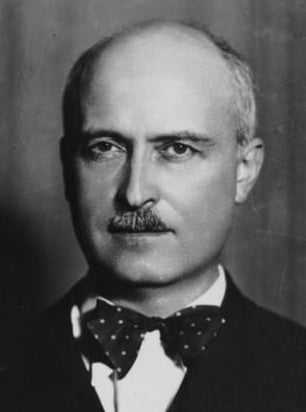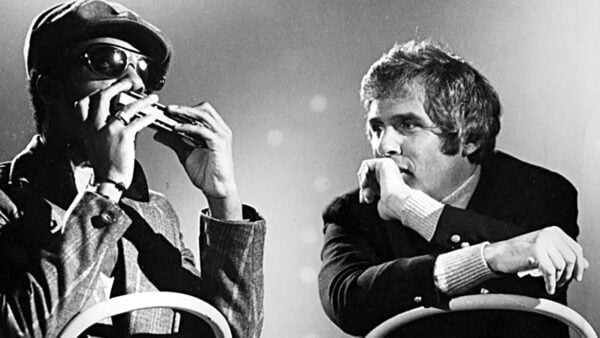 Jacques Ibert was born in Paris in 1890; his father was a businessman; his mother was a pianist. She began teaching him piano and violin at age 4. When young Jacques finished grade school, he found a job in a movie house, playing piano for silent films. In 1910, he enrolled in the Paris Conservatory, joining Arthur Honegger and Darius Milhaud. But their studies came to an abrupt end when the German army crossed into Belgium. Throughout Europe, young men suspended their lives, gleefully marching off to war (everyone said they’d be home by Christmas). Ibert enlisted in the navy and spent much of the First World War traveling the Mediterranean; an experience that would inspire his most famous composition, Escales or “Ports of Call.”
Jacques Ibert was born in Paris in 1890; his father was a businessman; his mother was a pianist. She began teaching him piano and violin at age 4. When young Jacques finished grade school, he found a job in a movie house, playing piano for silent films. In 1910, he enrolled in the Paris Conservatory, joining Arthur Honegger and Darius Milhaud. But their studies came to an abrupt end when the German army crossed into Belgium. Throughout Europe, young men suspended their lives, gleefully marching off to war (everyone said they’d be home by Christmas). Ibert enlisted in the navy and spent much of the First World War traveling the Mediterranean; an experience that would inspire his most famous composition, Escales or “Ports of Call.”
During the Second World War, Ibert’s music was banned by the Vichy government. He went into exile, finally settling in Switzerland. When Hitler fell, he returned to Paris, eventually running the Paris Opera and the Opéra-Comique.
Escales (Ports of Call)
This musical travel log takes us to Rome and Palermo, Italy; Tunis and Nefta in Africa; and Valencia in Spain. Ibert had returned to the Conservatoire after WWI, and won the Prix de Rome on his first attempt in 1919, giving him the privilege of studying in Rome for 2 years.
Trois pieces brèves
This is a woodwind quintet from 1930.
Suite Elisabéthaine
Ibert wrote a great deal of music for the stage and also the cinema (remember that he was a silent movie accompanist early in his life). In 1940, Ibert was banned by the Nazi-run Vichy government and retreated to the south of France in Antibes. In 1942, he composed music for a production of Shakespeare’s A Midsummer Night’s Dream in Marseilles. Here is a suite from that production, which makes use of music by early English composers including Orlando Gibbons and Henry Purcell.
Pièce
Ibert had a special affinity for the flute. The Pièce for solo flute was written during a late-night reception at the French embassy in Prague in 1936. The great flutist Marcel Moyse had played the Ibert Flute Concerto earlier in the evening (with the composer conducting) and Moyse was asked to play something for the guests afterwards. Ibert scribbled this little piece down.
La Ballade de la Geôle de Reading (The Ballad of Reading Gaol)
The earliest orchestral composition we have from Ibert, The Ballad of Reading Gaol, is inspired by a poem by Oscar Wilde, telling the story of the harsh prison atmosphere surrounding a man who murdered his beloved.
Flute Concerto
Ibert’s music is most often described as “eclectic” as he incorporates impressionism and sometimes even expressionism with the sounds of Les Six. He once said that “all systems are valid.” One can often hear satire and humor in his music. A good example of that is found in the famous Flute Concerto written for Marcel Moyse in 1933. Ibert said once, “I gave my instruments themes that corresponded with their sonorous qualities and respected their expressive possibilities.”
Deux steles orientées
Deux stèles orientées (Two Facing Inscriptions) for voice and flute alone, was written in 1926 when the composer was 36. The first poem compares the beloved to water and warns of the dangers of love. The second compares the beloved to the wind. The poet is Victor Segalen.
Tropismes pour des amours imaginaires
This music comes from the end of Ibert’s life, shortly after he was named the director of the organization that oversaw the Paris Opera and Opéra-Comique in 1955. Tropismes pour des amours imaginaires (or Tropisms for Imaginary Loves) is believed to have been intended as a ballet. Some of his last music, he retired that same year, 1957. He was then named to the Académie des Beaux-Arts. He died in Paris in 1962. The work received its premiere in 1975, long after Ibert’s death.
Concertino da camera
The saxophone is an especially French instrument, having been invented by Adolph Sax, a Belgian instrument maker who permanently settled in Paris in 1841. Many French composers have embraced its unique sound, not just in the jazz world, but in the classical world as well. Ibert wrote his concerto in 1935 for his friend, the great saxophonist Sigurd Rascher, who premiered it that same year.






